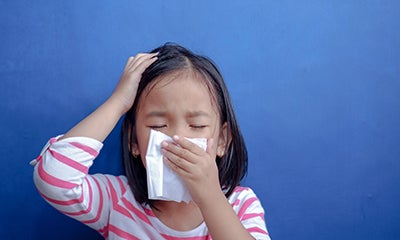Flu: What to Know for the 2023-2024 flu season
October 16, 2023
Categories: News
Tags: Infectious Diseases
Birmingham, Ala. (Oct. 16, 2023) — The 2023-2024 flu season is underway, which means it is time for families to start thinking about getting the flu vaccine and how to keep everyone healthy. Flu viruses usually cause the most illness during the colder months of the year. In the United States, flu season is from October to March. Delphene Noland, the Director of Infection and Prevention Control at Children’s of Alabama, answers some of the most frequently asked questions about this year’s flu season.
What can we expect this flu season?
The Centers for Disease Control and Prevention is anticipating that we will have an increase in the flu this year because we really did not have much of a flu season last year. This is the first year where we really don’t have any masking in place. The CDC is comparing this year to 2019 and anticipating an increase in flu cases.
What are flu symptoms in children?
Fever, general fatigue, sometimes children will have runny noses, cough, all the things you will think of with a typical cold, but mainly fever and fatigue.
When is the best time to get the annual flu vaccine?
We recommend getting the flu vaccine before the end of October to ensure you are protected during the height of the flu season.
How important is it for parents to make sure they are getting the flu vaccine for their children?
We know that flu vaccines work. We have had flu vaccines for years, so we know that being vaccinated as a whole works, so providing extra protection for our kids is so important. Just like any other vaccination, we want to make sure we are giving them the extra to try to prevent becoming positive for the flu.
What can parents do to keep their family healthy during the flu season?
First, handwashing is the number one thing that we can do to make sure we are protected. Cover your cough, stay home from work or school when you are sick, stay away from people who are sick, and watch for signs and symptoms. Good hygiene is necessary because we usually contaminate ourselves by putting our hands on our face and nose. The flu, RSV, COVID-19, and other viruses are spread by droplets, which are then spread by contaminated hands.
How do you treat a child’s flu at home, and when should you bring your child to see their pediatrician?
To treat your child at home, give Tylenol or Motrin, depending on the child's age. Parents should seek help from a medical professional when fever is not controlled by Tylenol when the child is not eating or drinking, or having at least six to eight wet diapers a day. It is not usually the flu that brings a patient to the emergency department; it is the complications of flu, which are dehydration, uncontrolled fever and/or pneumonia.
For more information on respiratory illnesses, click here.













